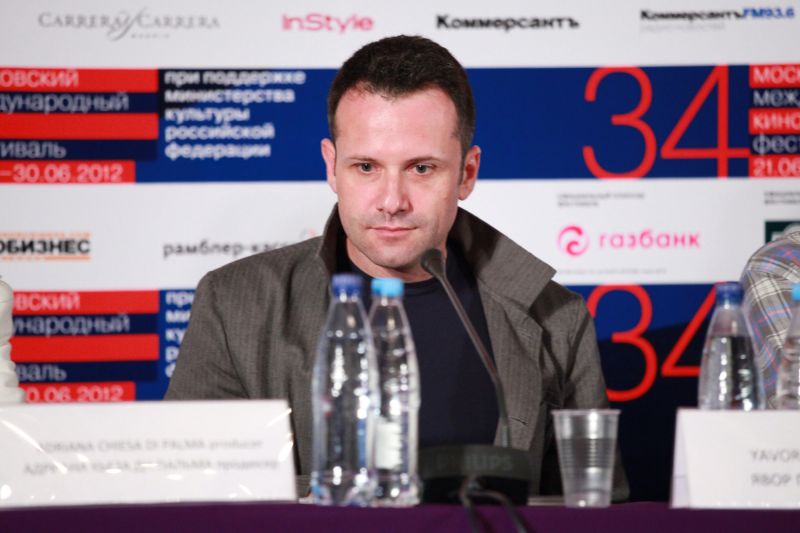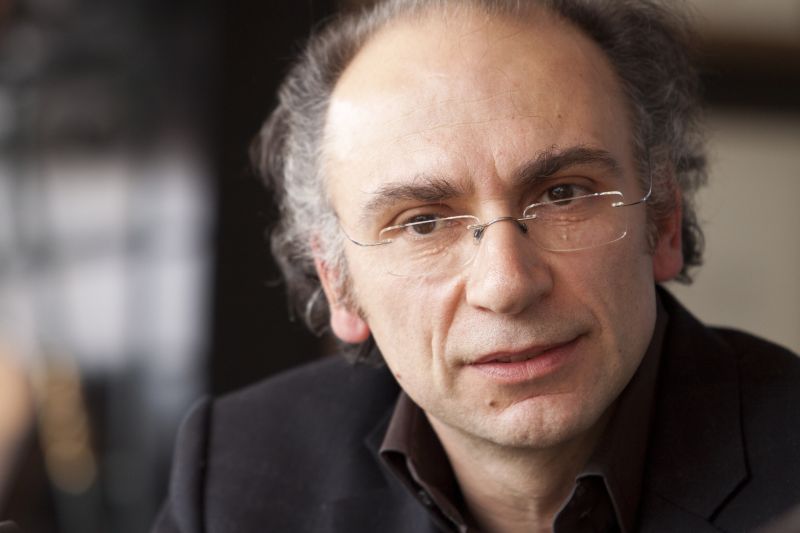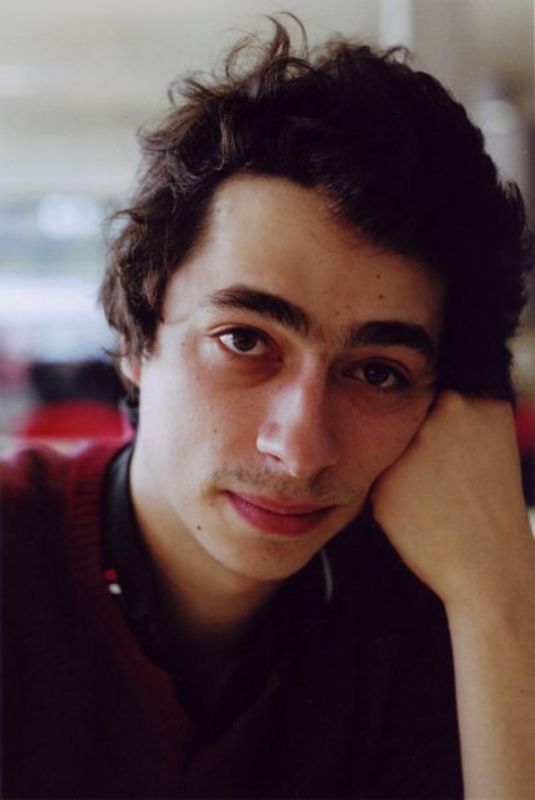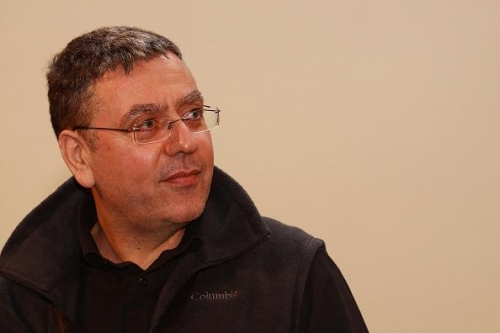|
|
||
|
Pro Tools
FILMFESTIVALS | 24/7 world wide coverageWelcome ! Enjoy the best of both worlds: Film & Festival News, exploring the best of the film festivals community. Launched in 1995, relentlessly connecting films to festivals, documenting and promoting festivals worldwide. Working on an upgrade soon. For collaboration, editorial contributions, or publicity, please send us an email here. User login |
Milcho on MOTHERS at SIFFOne day before arriving in Sofia, Bulgaria to speak to press about his latest film, MOTHERS, Goran Paskaljevic awarded Milcho Manchevski the Best Feature award from the 'Europe Out of Europe' section in Belgrade Film Festival March 06, 2011. Director of newly released in festivals ‘Mothers', Milcho Manchevski explains his film to press in Sofia, Bulgaria at SIFF 2011. March 08, 2011. Because this press conference was given in Bulgarian and his answers in English I have just been able to transcribe his answers (as they were in English and questions were in Bulgarian).
MILCHO: the truth I discovered was the need to follow my heart, my instinct and my soul... The way that this film came about because that's the way the film was conceived... And at the same time I'm extremely happy with the results... Let me elaborate just a little bit... When I decided to put these three stories together in one film, um, there was no program...The way a painter has the feeling when putting things together on the canvas. The way a jazz musician approaches a piece being completely spontaneous or driven by emotions. ...And that is a little different than the way most films are put together. In a way, I felt that the three stories of this film attracted each other to be in the same film. They had a magnet for each other and I was here just to do the manual labor... I believe this is an honest way to approach a film that is among other things an experimental film...
Director of festival, Stefan Kitanov, interrupted here to thank Milcho for coming as he travels to a different country almost every day.
MILCHO (in response to a question about the connection of the stories in his film) There is a lot of connections between the three parts. It's just that they're not what would be the traditional narrative links making them one unified narrative. The thematic connections are the spirit with the nature of truth in all the stories...In all three stories there are victims and perpetrators... In all three stories you have shifting situations, shifting allegiances and shifting setups. There's sort of a betrayal in all three stories. On the other hand, to me what was more important was that all three stories have similar taste. Taste that grows from the first into the second into the third story as it gets stronger, bigger, darker... Um, as far as making the narrative connections, because that's something that I was asked at the beginning, I was being asked about it when the script was being written. It would be easier to connect the three stories into one big story. But I've already done that with my past films. And I'm bored with making that kind of narrative. I was more interested in keeping this very sparkling, very...
Q: You have come from different festivals, in Brazil and in Belgrade. Now you won two awards in Belgrade. How do you think the people perceive your kind of cinema and Balkan cinema in general. Do they take it as something exotic or..
M: Um, well, I try to look at individual films not at general cinema. I'm not as interested in say, cinema from Macedonia or cinema from Sweden. I'm interested in this particular film by this particular filmmaker. We were talking about one filmmaker I'm more interested in his opus than his individual films. ... But, the question you raise is really important. Because of, and it has been approached in a serious manner in the past, I think allowing to be treated like an exotic animal shows lack of respect for something. And to even make films that make you look like an exotic animal is even more insulting to yourself. I try to make my films in a way where they are films which could be set in any place anywhere in the world and with little adaptations they could be.
Q: Your film was co-produced by different countries. Do you think this is the future of modern cinema?
MILCHO: Yes, this is the future of European cinema. I think it's a good idea for several reasons. Um, people get to exchange experiences when they come from different countries. They also bring different bits of culture to the same film. But on a purely practical level, it's more difficult to enjoy nepotism when you have to convince two, three or four countries, as opposed to one single country, to finance your film. In a way, it stimulates afair approach to film financing.
Q: You are teaching in NY? What do you teach your students?
MILCHO: Well, at the moment I am not teaching but when I do, I try to tell them two things: Craft and heart.
I can teach them some things when it comes to craft. But the important thing is that they really open their heart to themselves about what they really want to talk about. Are they learning just because they want to be a director or because they have things to say? So, I try to put a lot of emphasis on stimulating people to be honest to their stories and to their emotions rather than recycling old films.
Q: You prefer photography and writing more than cinema. Why do you think so?
MILCHO: Well, because you can make it [photography and writing] alone. You don't have to go around begging for money. You don't depend on technology and you don't depend on other egos. But on a purely formal level photography, or writing, as opposed to filmmaking is the following: When doing photographs you don't have to put the things in order. For example, when you write a story or a poem, you also don't have to explain it before you begin. With film, you are constantly explaining it while you are making it. And sometimes, um, in that process, the spontaneity gets lost.
Q: Which are your ‘Five Drops of Dreams'?
MILCHO: I have no idea. Um, probably the biggest discovery for me when I went to film school was experimental films. I tried to bring to piece, I tried to marry the narrative cinema with experimental film in my work. Um, that was the case with ‘Before the Rain', that was the case with ‘Dust' and that was certainly the case with ‘Mothers'. The questions of if that will be the case with the next film, which is called ‘Sunshine' where actually I am playing with what the notion of documentary film is in an experimental manner. It's a story about a really charismatic woman whose name is ‘Sunshine'. We're never sure whether she's crazy or not. I want record her fantasies. Um, and the rest I'm still trying to put together.
Q: In a portrait of the manners of experimental cinema how would this look like?
MILCHO: Well, the closest to what you're describing would probably be a film I made in film school and the film was fairly conceptual. All we saw was just a black screen and there was my voice going over it where I was talking about trying to make an original film and constantly failing at it.
Q: Characters truth and the truth of the story.
MILCHO: Even the thoughts of the film are not so important. For me, the most important is the feeling. The work of art is valuable finally for the feeling that it leaves within people. So, what I try to do in my films, all my films, especially this film, is to deal with this phrase, how to come to the end and not to lose, not to be a loser again. Maybe the answer is that we have to embrace sadness and loss and fear and to enjoy them.
Q: All of your films are co-productions but ‘Mothers'... Is the last part of the film a documentary or fiction? We could not tell.
MILCHO: I love that.
Q: I like better the films the two of your films that tell three stories. Somehow I felt closer. Before the Rain is one of the masterpieces not only in Balkan cinema but in world cinema as well. In Bulgaria we say we have to have a lot of films in order that some are good but I haven't seen any Macedonian film which is not good.
MILCHO: I have to thank you on behalf of my fellow filmmakers but I really can't speak on their behalf.
It has always been easy putting films together in Macedonia. That's together, forget about actually shooting. And see I don't really like talking about financing but I can give you some information. The Macedonian state has put in all of my four films combined less money than they put in one decently budgeted Macedonia film made over the last ten or fifteen years. The co-production money that came from other European countries into all of my four films so far has been to the relationship or roughly 5:1.
Q: You put tomatoes in your films. Will you keep using the theme of tomatoes in your films?
MILCHO: Yes, there's no way out of it.
And that's a wrap! Look for Milcho's latest film ‘Mothers' in a festival or theater near you!
Transcribed and written by Vanessa McMahon Milcho Manchevski on panel in Sofia March 08, 2011 16.03.2011 | Sofia International Film Festival's blog Cat. : Balkan cinema Before the Rain Belgrade Brazil Bulgaria Che Director Entertainment Entertainment Europe Europe Out of Europe European cinema Film finance Goran Paskaljevic Human Interest Human Interest Macedonia Milcho on MOTHERS at SIFF Milčo Mančevski musician painter Sofia Stefan Kitanov Sweden the Best Feature Award Vanessa McMahon
|
LinksThe Bulletin Board > The Bulletin Board Blog Following News Interview with IFTA Chairman (AFM)
Interview with Cannes Marche du Film Director
Filmfestivals.com dailies live coverage from > Live from India
Useful links for the indies: > Big files transfer
+ SUBSCRIBE to the weekly Newsletter Deals+ Special offers and discounts from filmfestivals.com Selected fun offers
> Bonus Casino
User imagesAbout Sofia International Film Festival International film festival for feature films, documentaries and shorts (mainly Bulgarian). Main themes: International competition for first and second films, Balkan & Bulgarian cinema, Cinema Europe, World screen, retrospectives. View my profile Send me a message My festivalThe EditorUser contributions |




























